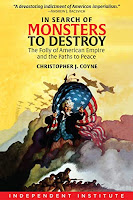The kid in
the photo believed that the material world is an illusion. Those beliefs about
the nature of reality probably led him to be somewhat less materialistic than
he would otherwise have been. However, an observer would have had to look
closely to find any evidence that he, and his school colleagues who held
similar beliefs, were behaving as though they did not believe the account of
reality provided by their sense organs. They didn’t attempt to survive without
food, to defy gravity by jumping off tall buildings, or to do much else to
suggest that they had a different view of reality than most other teenagers
living in Australia in 1960. The main difference an astute observer would have
seen was their practice of treating illness as an error of thinking and viewing
medical intervention as unnecessary and undesirable under most circumstances.
I am
writing this article because a few people who have known me at different times
of my life might be interested to know something about the process by which my
beliefs have changed over the years.
Youthful
preoccupations
When I was a
child, I liked sitting on the gate post of a fence separating our garden from
the farmyard. That was my favorite spot for observing what the horses, sheep
dogs, cows, pet lambs, humans etc. were doing in the farmyard. One day when I
was sitting there – I would have been about 6 years old - my father told me
that everything I saw in the farmyard was an illusion. I thought at first that
he was joking, but he was in the process of informing me that he had decided to
attend the Christian Science church and had arranged for me to attend their Sunday
school.
Over
subsequent years, I gradually became immersed in the teachings of Mary Baker
Eddy, and her book, Science and Health (S&H). The final 3 years of my secondary
education were spent as a border at Huntingtower, a school run by Christian
Scientists in the Melbourne suburb of Mount Waverley. At that time, the school
only accepted students who had a family background in Christian Science.
Huntingtower still has a focus on the individual personal development of
students and provides excellent educational opportunities. I am grateful that
one of my aunts paid the fees to enable me to attend that school.
I have long
been aware that there was some similarity between Mrs. Eddy’s teachings and the
philosophy of Plato. I now see a closer resemblance to the Neoplatonism of
Plotinus. Plotinus believed that “The One”, the absolutely simple
first principle of all, was the cause of being for everything else in the
universe. Mrs.
Eddy wrote:
“Principle and its idea is one, and this one is God, omnipotent,
omniscient, and omnipresent Being, and His reflection is man and the universe”
(S&H, 465-6).
The
Neoplatonists saw life’s purpose as being “to bring back the god
in us to the divine in the All”. Mrs. Eddy urged her followers:
“We must
form perfect models in thought and look at them continually, or we shall never
carve them out in grand and noble lives. Let unselfishness, goodness,
mercy, justice, health, holiness, love — the kingdom of heaven — reign within
us, and sin, disease, and death will diminish until they finally disappear”
(S&H, 248).
Secular
pursuits
I abandoned
Neoplatonism at the end of my teen years. At that time, I didn’t consciously
reject that belief system even though I can remember becoming increasingly
frustrated at the difficulty of attempting to follow Mrs. Eddy’s injunction:
“Stand porter at the door of thought” (S&H, 392). My social life and
academic interests made me less inclined to spend time engaging in what I was
coming to view as speculations about the nature of “ultimate reality”. I was beginning to study economics, so my
thinking focused increasingly on how human aspirations could best be met. At
that time, I became interested in the writings of J S Mill on liberty and
utilitarianism.
Over the years, my philosophic interests developed along
with a work career focused on public policy relating to economic development,
international trade, productivity growth and technological progress. That led
to increasing interest in the role of liberty in economic progress, and human
flourishing more generally.
As a consequence of my interest in human flourishing, I have
come to view Aristotle as the greatest of the philosophers of Ancient Greece. My
book, Freedom,
Progress, and Human Flourishing, explains the framework of my current thinking.
These days, the idea that the evidence of our senses is
illusory seems as strange to me as it was when I was the child sitting on the
gate post. Our senses provide the direct experience of reality that members of our
species require to thrive. Since we are conscious beings, we are aware of our own
use of maps, and models (both metaphorical and actual) to communicate and reason
about what we experience. However, we also know that maps and models do not always
correspond to reality. The search for truth is about seeking better maps and
models.
The
lurking questions
There were two questions lurking in the back of my mind after
I had abandoned Neoplatonism. First, how could a change in thinking bring about
the healing of serious illnesses which seemed to have a physical cause? Second,
why did the same techniques sometimes fail to provide the lasting healings
hoped for in respect of disorders that seemed to have a psychological rather
than physical cause?
I do not doubt the veracity of most of the large number of
testimonials that church members presented about healings that they experienced.
As I remember it, most of the church members I knew either had personal
experience of healings themselves or were family members of people who had
obtained healings. The prevalence of healings seems to me to be the most
obvious factor explaining the rapid growth of this church in the first half of
the 20th century, when medical science was less advanced than it is today.
Advances in medicine provide the most obvious explanation for the decline in church
membership in recent decades.
I think the answer to my first question lies in the
potential impact of a change of an individual’s thinking on their body’s
natural defences against disease. For example, a substantial amount of evidence has
accumulated about the relationship between psychological stress and the human
immune system. There is a lot of advice available about the importance of
stress management in maintaining good health, and about how to manage stress
via physical exercise, breathing exercises, yoga, meditation, and so forth. However,
I don’t think many people give enough attention to the potential for negative thinking
associated with medication to influence its efficacy. Before you decide to take
any medication prescribed to you, it seems to me to be wise to have at least a
rudimentary knowledge of how the medication works and the impacts that most
users experience. If that doesn’t provide a basis for you to expect positive
outcomes, perhaps you should seek another opinion.
My answer to the question of why lasting healings didn’t
always occur in respect of psychological disorders is that an appropriate
change of thinking had not actually occurred. That was not necessarily attributable
to insufficient vigilance as “porter at the door of thought”. In my own
experience, I think the opposite was the case. Trying hard to keep fear of
stuttering and blocking out of my mind resulted in greater fear of disfluency
than I would otherwise have experienced. The reason for that became clear when someone
suggested that I try the “don’t
think of a pink elephant” exercise. The exercise consists of trying very
hard not to think about pink elephants and then observing what images come to
mind. Deliberate attempts to suppress thoughts makes them more likely to occupy
your mind.
The questions lurking in the back of my mind made me
receptive to Neuro-Semantics – a model of how we create and embody meaning
developed by Michael Hall and Bobby Bodenhamer - when I learned about it 20
years ago. For present purposes, I think the message of Neuro-Semantics can
best be illustrated by the following
quote from an article by Michael Hall entitled, “The Inner Game
of Frame”:
‘The frames we set about our experiences are much, much,
much more important and critical than our experiences. In this, “there is
no good or bad but thinking makes it so” as Shakespeare noted. In this,
“men are not disturbed by things, they are disturbed by their interpretation of
things.” In this, “as we think in our heart, so we are.” In this we
have the cognitive-behavioral foundation for human functioning.’
Readers of my book, Freedom,
Progress, and Human Flourishing, will find a reference to Hall’s views
on the importance of frames of meaning in the discussion of why people do not
always move on to satisfying higher needs, as Abraham Maslow suggested they
would, once their basic needs have been met (p 168-9).
Beyond utilitarianism
One aspect of Mrs. Eddy’s teachings that I have held on to
is the idea that the identity of the individual person is a metaphysical
concept. Mrs. Eddy made the point persuasively as follows:
‘If the real man is in the material body, you take away a
portion of the man when you amputate a limb; the surgeon destroys manhood, and
worms annihilate it. But the loss of a limb or injury to a tissue is
sometimes the quickener of manliness; and the unfortunate cripple may present
more nobility than the statuesque athlete, — teaching us by his very
deprivations, that “a man’s a man, for a’ that.” ‘ (S&H, 172)
The Neoplatonism of my youth has also left me receptive to
the idea that to fully flourish we need to be willing to transcend utilitarian
preoccupations. That idea is, of course, also present in Aristotle’s view that
practice of the virtues is central to individual flourishing. In Freedom,
Progress, and Human Flourishing, I summarised my current view as follows:
“Liberty
and technological progress give us potential to obtain more of the basic goods
of flourishing humans. To fully flourish, however, we need to be willing to
transcend utilitarian preoccupations and to contemplate what our human nature
requires of us as individuals. Perhaps it is in our nature to bring wonder into
our lives by seeking the essence of truth, beauty, and goodness. If so, we may
take pleasure in doing that, whilst rejecting the idea that it is appropriate
to employ the metrics of pleasure and pain to assess the worth of our endeavors”
(197).
Postscript
I neglected to mention my guru, Tim Gallwey. I have been a fan of Tim Gallwey's books for more than 20 years. I found "The Inner Game of Golf" particularly helpful in aspects of my life that have little to do with golf. Tim Gallwey's insights about the inner game of golf helped me to see some personal problems in perspective. (By the way, I play golf about once a year and play no better might be expected!)
Tim Gallwey describes how people tend to interfere with their performance in activities requiring muscle coordination when they respond to self-doubt by "trying harder". Trying harder often entails increasing muscle tension. Gallwey's books offer practical suggestions to circumvent self-doubt.
Tim Gallwey says: “We all have inner resources beyond what we realize”. You discover your true identity as you draw on those resource to master the inner game.
In this video Tim Gallwey talks about the personal philosophy that motivates him.
My podcast episode entitled, "Tim Gallwey, my Inner Game guru", can be found here.


















